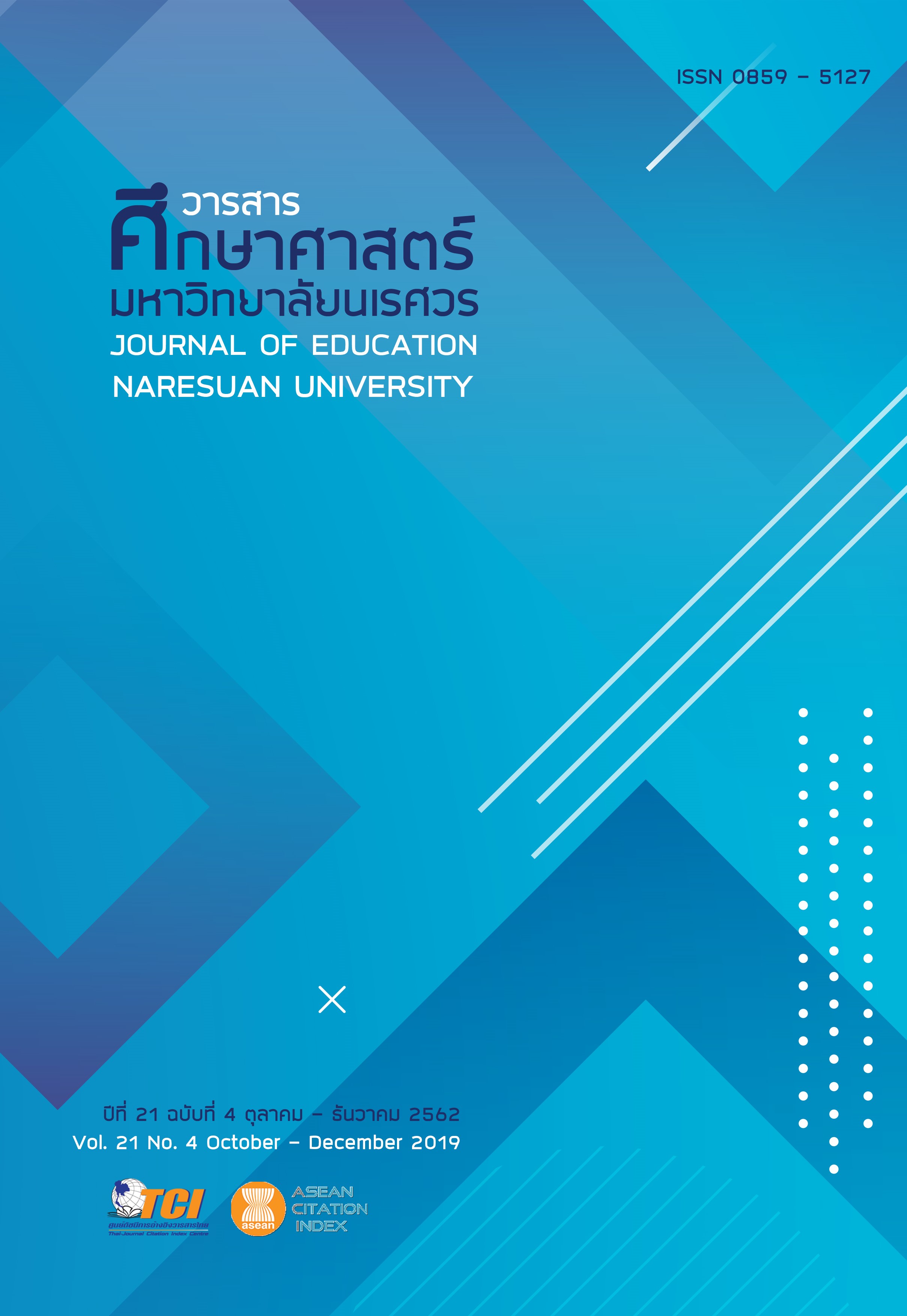ผลการจัดการเรียนรู้แบบสืบเสาะหาความรู้ที่เน้นการคิดอย่างมีวิจารณญาณ เรื่อง เคมีอินทรีย์ ที่มีต่อผลสัมฤทธิ์ทางการเรียนและความสามารถในการคิดอย่างมีวิจารณญาณของนักเรียนชั้นมัธยมศึกษาปีที่ 5 (EFFECTS OF INQUIRY-BASED LEARNING EMPHASIZING CRITICAL THINKING IN ORGANIC CHEMISTRY ON LEARNING ACHIEVEMENT AND CRITICAL THINKING ABILITIES OF ELEVENTH GRADE STUDENTS)
Main Article Content
Abstract
การวิจัยครั้งนี้มีวัตถุประสงค์เพื่อศึกษาผลการจัดการเรียนรู้แบบสืบเสาะหาความรู้ที่เน้นการคิดอย่างมีวิจารณญาณ เรื่อง เคมีอินทรีย์ ที่มีต่อผลสัมฤทธิ์ทางการเรียน และความสามารถในการคิดอย่างมีวิจารณญาณของนักเรียนชั้นมัธยมศึกษาปีที่ 5 โดยใช้รูปแบบการวิจัยเชิงปฏิบัติการในชั้นเรียน ซึ่งกลุ่มเป้าหมายที่ใช้ในการวิจัยครั้งนี้คือนักเรียนชั้นมัธยมศึกษาปีที่ 5 ภาคเรียนที่ 2 ปีการศึกษา 2559 โรงเรียนจุฬาภรณราชวิทยาลัย ชลบุรี จำนวน 24 คน เครื่องมือที่ใช้ในการวิจัยประกอบด้วย แผนการจัดการเรียนรู้แบบสืบเสาะหาความรู้ที่เน้นการคิดอย่างมีวิจารณญาณ เรื่อง เคมีอินทรีย์ แบบทดสอบวัดผลสัมฤทธิ์ทางการเรียน และแบบทดสอบวัดความสามารถในการคิดอย่างมีวิจารณญาณ สถิติที่ใช้ในการวิเคราะห์ข้อมูล ได้แก่ ร้อยละ ค่าเฉลี่ย และส่วนเบี่ยงเบนมาตรฐาน
ผลการวิจัย พบว่า
1. การจัดการเรียนรู้แบบสืบเสาะหาความรู้ที่เน้นการคิดอย่างมีวิจารณญาณ เรื่อง เคมีอินทรีย์ ส่งผลให้นักเรียนมีผลสัมฤทธิ์ทางการเรียนสูงขึ้นร้อยละ 34.50 ซึ่งมีพัฒนาการอยู่ในระดับปานกลาง
2. การจัดการเรียนรู้แบบสืบเสาะหาความรู้ที่เน้นการคิดอย่างมีวิจารณญาณ เรื่อง เคมีอินทรีย์ ส่งผลให้นักเรียนมีความสามารถในการคิดอย่างมีวิจารณญาณสูงขึ้นร้อยละ 47.33 ซึ่งมีพัฒนาการอยู่ในระดับปานกลาง
EFFECTS OF INQUIRY-BASED LEARNING EMPHASIZING CRITICAL THINKING IN ORGANIC CHEMISTRY ON LEARNING ACHIEVEMENT AND CRITICAL THINKING ABILITIES OF ELEVENTH GRADE STUDENTS
The purposes of this research were to study effects of inquiry-based learning emphasizing critical thinking in organic chemistry on learning achievement and critical thinking abilities of eleventh grade students. This research was a classroom action research. The participants consisted of 24 eleventh grade students in the second semester of the 2016 academic year at Princess Chulabhorn’s College, Chonburi. The research instruments were lesson plans based on inquiry-based learning emphasizing critical thinking in organic chemistry, learning achievement test, and critical thinking abilities test. The data were analyzed by percentage, mean, and standard deviation. The research results revealed that:
1. The learning achievement development scores after using inquiry-based learning emphasizing critical thinking in organic chemistry were at intermediate level with 34.50%.
2. The critical thinking abilities development scores after using inquiry-based learning emphasizing critical thinking in organic chemistry were at intermediate level with 47.33%.
Article Details
The owner of the article does not copy or violate any of its copyright. If any copyright infringement occurs or prosecution, in any case, the Editorial Board is not involved in all the rights to the owner of the article to be performed.
References
2. Bobthong, W. Senior professional level teachers at Princess Chulabhorn Science High School. (2016, February 10). Interview. [in Thai]
3. Bureau of Academic Affairs and Educational Standards. (2006). Synthesis report on concepts and methods of teaching and learning promote analytical thinking skills science learning. Bangkok: Agricultural Co-operative Federation of Thailand. [in Thai]
4. Chaitiang, S. (2013). Effects of using the 7E instructional model in chemistry on learning achievement critical thinking ability and science process skill for Mathayomsuksa 6 students at Noensaiwittayakom School Trat Province (Master thesis). Chonburi: Burapha University. [in Thai]
5. Chatkup, S., & Chuchat, U. (2011). Critical thinking. Bangkok: Office of the Education Council. [in Thai]
6. Educational Supervisor Curriculum. (2014). Curriculum of region science school in senior high school B.E. 2554 (Revised edition B.E. 2557). Bangkok: n.p. [in Thai]
7. Karnjanawasee, S. (2009). Classical test theory (6th ed.). Bangkok: Chulalongkorn University Press. [in Thai]
8. Khammani, T., et al. (2001). Thinking. Bangkok: Institute of Academic Development. [in Thai]
9. Khammani, T., et al. (2002). Learning process. Bangkok: Institute of academic development. [in Thai]
10. Khongton, T. (2014). Enhancing achievement of learning in organic chemistry topic of Mathayomsuksa 5 students by model-based learning (Master thesis). Bangkok: King Mongkut’s University of Technology Thonburi. [in Thai]
11. Ministry of Education. (2008). The Basic Education Core Curriculum B.E. 2551. Bangkok: Agricultural Co-operative Federation of Thailand. [in Thai]
12. Ministry of Education. (2010). National Education Act “5 years of full version” (2nd ed.). Bangkok: Soutpaisal. [in Thai]
13. Sinlarat, P., et al. (2015). Thinking principle. Bangkok: Dhurakij Pundit University. [in Thai]
14. Sornthako, S. (2007). Critical thinking of grade level 3 students learning science through inquiry method supplemented by critical thinking activities (Master thesis). Chiang Mai: Chiang Mai University. [in Thai]
15. Srivirojn, W. (2014). The Development of Instructional Model in Stoichiometry Based on Integrated Inquiry Training and Cooperative Learning to Enhance Critical Thinking for Upper Secondary Students in An Enrichment Science Classroom. Journal of Education Naresuan University, 16(3), 1-13. [in Thai]
16. Susaorat, P. (2013). Thinking development (5th ed.). Bangkok: 9119 Technic Printing. [in Thai]
17. Suttirat, C. (2009). 80’s innovations by child-centered learning. Bangkok: Danex Intercorporation. [in Thai]
18. Tananchai, T. (n.d.). Science learning and instruction to promote learning skills for the 21st Century Learners. Tak: Sapphawitthayakhom School. [in Thai]
19. Wiangwalai, S. (2013). Learning management. Bangkok: Odian Store. [in Thai]
20. Yasukham, T. (2012). Enhancement of learning achievement and critical thinking skills science by using inquiry learning activities of chemical reaction rate. Journal of Education Naresuan University, 14(2), 23-33. [in Thai]


